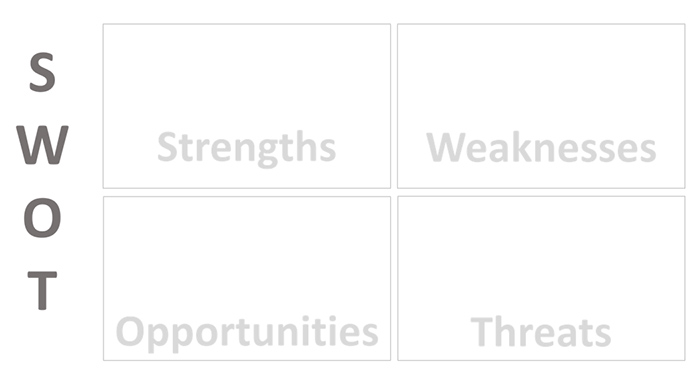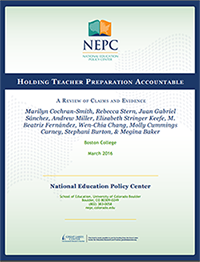08 Jul2016
By Kym Vanderbilt
The views expressed in this post do not necessarily reflect the views of AACTE.
At City University of New York’s Lehman College in the Bronx, our early childhood education students are known for their strong work ethic and resilience. Most are working parents, some with long commutes to class on public transit, and approximately 70% are bilingual, having learned English as a second language.
Early on in the edTPA process, we set out to disprove the contention that teachers of very young children – our teachers work with kids as young as 2 years old – would not score well on the assessment. It’s true that it can be challenging to reflect and write about giving feedback to such young students, especially when some of our teachers struggle with written English. But our students led the way in determining developmentally appropriate ways to provide feedback, and they documented their work during writing workshops on the weekends.
27 Jun2016
By Abigail Mercadante
Last month, the National Assessment Governing Board released its first-ever Nation’s Report Card for Technology and Engineering Literacy via a webcast from the Michigan Science Center. The event presented not only test results but also perspectives from educators and from a panel of students who had participated in the interactive, digital-based assessment, which was administered to more than 20,000 eighth-graders nationwide in 2014.
The National Assessment of Educational Progress (NAEP), commonly known as the “nation’s report card,” was developed in 1969 to measure how students in America compare with students of other countries in the areas of reading and math. Other subjects have been added over the years, and 2014 marked the first assessment targeting technology and engineering skills. The new test is also the first fully computer-based NAEP assessment.
12 May2016
By Suzie Henderson
The author, assistant principal at Pepperell Elementary School in Lindale, Georgia, is one of several PK-12 educators who presented on their experiences with edTPA and their partnerships with educator preparation providers at last month’s 2016 edTPA National Implementation Conference in Savannah, GA.
Do you want to strengthen relationships between PK-12 administrators and educator preparation faculty? Try going out for lunch.
That’s how the relationship between Pepperell Elementary School, where I’m an assistant principal, and the Shorter University School of Education really took off.
I was at lunch a few years ago with Kristy Brown, who supervises student teaching for Shorter. I told her my staff needed professional development in teaching writing skills to our diverse learners. She said she needed classrooms to host teacher candidates for their clinical experiences.
10 May2016
By Tommy Navickas
This article originally appeared on the Illinois State University news site. It is reposted here with permission. The views expressed in this article do not necessarily reflect the views of AACTE.
Last fall semester, Blake Slutz ’15 was among Illinois State University’s 47 special education graduates. He and his fellow new alumni all passed the edTPA test during their student teaching semesters. Their success was not isolated. Across the university’s entire education program, the largest in the state, 99% of teacher candidates passed the assessment. Illinois State’s performance far exceeded the national average of 85%.
25 Apr2016
By AACTE
 A set of principles released this month gives educators and policy makers new guidance on the secure and ethical use of video and other classroom materials gathered as part of preservice teacher preparation. A task force of educators led by AACTE created the principles to ensure the privacy of those whose images and work are captured in the performance assessment of aspiring teachers.
A set of principles released this month gives educators and policy makers new guidance on the secure and ethical use of video and other classroom materials gathered as part of preservice teacher preparation. A task force of educators led by AACTE created the principles to ensure the privacy of those whose images and work are captured in the performance assessment of aspiring teachers.
The 27-member task force began convening last fall, meeting several times to develop the principles and supporting documents. Their brief brochure, “Securing Personal Information in Performance Assessment of Teacher Candidates,” explains the importance of videos and other artifacts in teacher performance assessment and introduces nine principles to guide those involved in creating or reviewing materials that include student images or identifying information.
19 Apr2016
By Jerrica Thurman
Please join educators from Georgia in an interactive webinar where they will share how they incorporated professional ethics training and assessments in their curriculum and used the resulting data to inform program improvements.
Preparing Preservice Educators in Ethical Decision Making Using Innovative Strategies
Tuesday, April 26, 2016, 11:00 a.m. – 12:00 p.m. EDT
Presenters:
- Anne Marie Fenton, Director, Assessment, Georgia Professional Standards Commission
- Sarah Hallstein, Teacher, Glenwood Primary School, Rome, Georgia
- Edward Hill, Dean and Associate Professor, College of Education, Fort Valley State University
- Troy Hutchings, Senior Strategic Advisor – Educator Ethics, Educational Testing Service
- Jack Parish, Associate Dean, Outreach and Engagement, College of Education, University of Georgia
- Francis Roe, Director of Field Experiences and Clinical Practice, Charter School of Education and Human Sciences, Berry College
- Paul Shaw, Division Director, Ethics, Georgia Professional Standards Commission
Hear from these industry leaders as they walk you through their state’s work, in collaboration with Educational Testing Service, to deploy innovative strategies to prepare their state’s candidates in educator ethics.
18 Apr2016
By Rod Jonas
The North Dakota Association of Colleges for Teacher Education (NDACTE) received an AACTE State Chapter Support Grant last year to assist with the development and administration of a set of common assessments to be used by all North Dakota teacher preparation programs to improve the effectiveness of programs and quality of graduates.
During this school year, members of NDACTE have engaged in meetings and training workshops to learn how to effectively implement four common assessments: the Preservice Teacher Exit Survey, the Transition to Teaching Survey, the Supervisor Survey, and the Preservice Teacher Observational Assessment.
12 Apr2016
By Linda McKee
A new agreement between AACTE and Educational Testing Service (ETS) will bring support to AACTE member programs as they implement performance assessments with their students. Under the agreement, AACTE will develop various events, online platforms, and communications related to the assessments PPAT, NOTE, and ProEthica.
AACTE is assisting ETS with the development of a curriculum clinic for member institutions that are using the PPAT and piloting NOTE. The clinic aims to guide programs through curriculum redesign based on the reports generated through the performance assessments. AACTE is working on a curriculum matrix template to be used with participating educator preparation providers (EPPs) in a review of their data with ETS. AACTE also will coordinate the creation of case studies with volunteer EPPs to build out the clinic process, to be followed by an interactive curriculum clinic that will guide teams from the EPPs through the redesign process.
05 Apr2016
By Sharon Robinson
It’s axiomatic that experts in a field are better equipped than outsiders to design interventions that will work. Yet in education, we face a constant barrage of external reform efforts that fail to incorporate professional knowledge and expertise—and they just don’t work.
This point is reinforced in recent research out of the National Education Policy Center. In this study, Marilyn Cochran-Smith and her colleagues at Boston College (MA) examine the evidentiary base underlying four national initiatives for teacher preparation program accountability and improvement. They find that only one of the initiatives—the beginning-teacher performance assessment edTPA, designed and managed by the profession—is founded on claims supported by research. With a measure that is valid, scoring that is reliable, and therefore results that are accurate, we have a serious tool for program improvement.
05 Apr2016
By Lillian Chenoweth

Image From the SWOT Analysis Template
Source: OPS #3: Creating a Quality Assurance System
Have you ever been to a workshop that offered a Make-and-Take: Make a project, wrap it up, and take it home? In AACTE’s Online Professional Seminars (OPSs), you can do just that. The models and other resources shared in these short courses allow you to select materials for immediate application in your own setting, download them in user-friendly files, and then share with colleagues at your home institution.
22 Mar2016
By Kristin McCabe
 A new policy brief out of the National Education Policy Center (NEPC) reviews the evidentiary base underlying four national initiatives for teacher preparation program accountability and finds that only one of them—the beginning-teacher performance assessment edTPA—is founded on claims supported by research. The other three mechanisms included in the study are the state and institutional reporting requirements under the Higher Education Act (HEA), the Council for the Accreditation of Educator Preparation (CAEP) standards and system, and the National Council on Teacher Quality (NCTQ) Teacher Prep Review.
A new policy brief out of the National Education Policy Center (NEPC) reviews the evidentiary base underlying four national initiatives for teacher preparation program accountability and finds that only one of them—the beginning-teacher performance assessment edTPA—is founded on claims supported by research. The other three mechanisms included in the study are the state and institutional reporting requirements under the Higher Education Act (HEA), the Council for the Accreditation of Educator Preparation (CAEP) standards and system, and the National Council on Teacher Quality (NCTQ) Teacher Prep Review.
Holding Teacher Preparation Accountable: A Review of Claims and Evidence, conducted by Marilyn Cochran-Smith and colleagues at Boston College (MA), investigated two primary questions: What claims does each initiative make about how it contributes to the preparation of high-quality teachers? And is there evidence that supports these claims? In addition, researchers looked at the initiatives’ potential to meet their shared goal of reducing educational inequity.
18 Mar2016
By Linda McKee
 The growing conversation, contentious or not, in the teacher preparation community at large about how to prepare great educators is good for the profession and PK-12 students—and is also helping to improve edTPA support and assessment, Stanford University’s Ray Pecheone told 350 educators at the recent AACTE Annual Meeting.
The growing conversation, contentious or not, in the teacher preparation community at large about how to prepare great educators is good for the profession and PK-12 students—and is also helping to improve edTPA support and assessment, Stanford University’s Ray Pecheone told 350 educators at the recent AACTE Annual Meeting.
Pecheone, executive director of the Stanford Center for Assessment, Learning, and Equity (SCALE), said during the February 25 edTPA breakfast session, “The fact that the profession is having this dialogue about what makes an effective teacher is critical. Engage it! Embrace it! Through this dialogue edTPA has gotten better. It’s a continuous improvement model.”
08 Mar2016
By Sharon Robinson
As performance assessment of teacher candidates becomes more widespread and as more video evidence is collected in classrooms, we have to make sure that everyone involved with these videos—and other artifacts assembled for assessment purposes—understands how they may and may not be used. I’m pleased to report that a broad base of educators, convened by AACTE to bring various stakeholders’ perspectives to the discussion, is making promising strides to help safeguard the personal information of both teacher candidates and the students in their classes.
I wrote about the importance of this topic last year (see “Safeguarding Student Data Is Everyone’s Business”), celebrating the White House’s call for heightened attention to protecting students’ digital privacy. The whole education field must engage in this campaign, and AACTE takes its role seriously. Since last fall, we have been convening an Information Privacy Task Force to develop principles regarding the secure and ethical use of classroom video and associated materials collected in performance assessments of newly prepared teachers.
09 Feb2016
By Kristin McCabe
The annual National edTPA Implementation Conference will be held March 31 – April 2 at the Savannah Marriott Riverfront in Savannah, GA. The program planning committee seeks session proposals by Monday, February 15, from implementers of edTPA, the PK-12 community, and others involved in supporting teachers and candidates in using the assessment.
The conference, “Building Bridges to Highly Accomplished Teaching: From Preservice to Teacher Leader,” aims to include interactive sessions to share and develop practices, perspectives, and research aligned with the following strands:
03 Feb2016
By Deborah Koolbeck
On February 2, the U.S. Department of Education released guidance to chief state school officers on how No Child Left Behind (NCLB) funds in effect through the 2016-2017 school year may be used to “eliminate redundancy and ensure efficacy and quality of assessment.” You might recall that the Department released a Testing Action Plan in October 2015 to reduce the overtesting of our nation’s youth.
The guidance elaborates on what the Department views as principles for good assessments. The principles state that every assessment should be
- Worth taking
- High quality
- Time limited
- Fair, and supportive of fairness, in equity in educational opportunity
- Fully transparent to students and parents
- Just one of multiple measures
- Tied to improved learning










 The growing conversation, contentious or not, in the teacher preparation community at large about how to prepare great educators is good for the profession and PK-12 students—and is also helping to improve edTPA support and assessment, Stanford University’s Ray Pecheone told 350 educators at the recent AACTE Annual Meeting.
The growing conversation, contentious or not, in the teacher preparation community at large about how to prepare great educators is good for the profession and PK-12 students—and is also helping to improve edTPA support and assessment, Stanford University’s Ray Pecheone told 350 educators at the recent AACTE Annual Meeting.